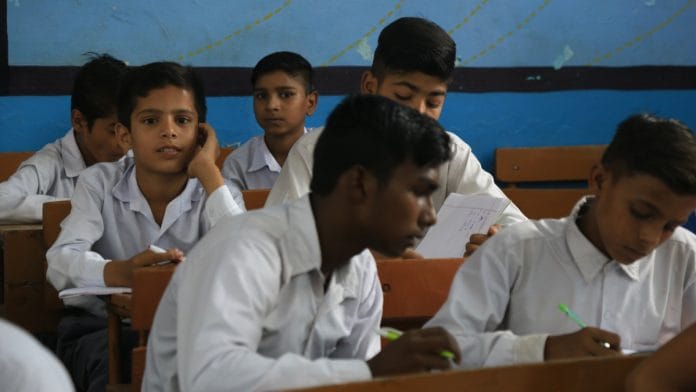Report reveals that few private schools have fulfilled this mandatory condition under the RTE Act, and state govts haven’t cracked the whip.
New Delhi: Private schools in India have over 20 lakh seats reserved each year for children from the economically weaker sections (EWS) of society, but only 20 per cent of them get filled, a report by legislative rights group Indus Action has revealed.
Under Section 12 (1) (c) of the Right to Education (RTE) Act, 2009, 25 per cent of seats from private, unaided schools are reserved for EWS children. However, over the years, many schools and even state governments have not taken the Act seriously.
States like Delhi, Gujarat and Rajasthan have performed very well, but others are yet to catch up, the report said.
Indus Action is a Delhi-based organisation, which works closely with the state and Central governments on the implementation of legislative rights like RTE.
Disappointing figures
From an all-India enrolment figure of 5.1 lakh in 2013-14, the first year that the Act was seriously implemented by schools, the number declined to 4.8 lakh in 2014-15, then rose to 6 lakh in 2015-16, and finally hit a low of 4.3 lakh in 2016-17. The data has been collated by the Unified District Information System for Education (U-DISE), which is the official data collecting platform of the government of India.
The 2015-16 figure represented 27 per cent enrolment on EWS seats, while for the other three years, the percentage has hovered around the 20 per cent mark.
The report also showed that many schools are still not opening their doors to children from poor families. The number of schools that offered EWS seats was just 16 per cent in 2016-17.
“Lack of school participation is one of the biggest reasons for a low fill rate,” said the report.
Looking at the low rates of admission in the EWS category, the Union Ministry of Human Resource Development sent a letter to all the states earlier this month, asking them to submit reports on the issue. The ministry, however, said it could only play a monitoring role, and not force states to adopt the rule, as education is a state subject.
Also read: Private schools will lose affiliation if they charge extra fees or sell uniforms: CBSE
Reasons for low admissions
There are many reasons for low admissions in the EWS category, ranging from private schools not willing to give admission to students to parents not approaching schools because of lack of awareness.
“A major factor which affects enrolment in this category is the social stigma. Many schools don’t open up their doors to children from the weaker section of society, thinking that they will not be able adjust with the rest of the children,” said Kanika Verma, strategy head of Indus Action.
“Also, many parents are not aware that their children can get admission in private schools, so they end up sending them to government schools only. That is where we are trying to step in and create awareness about the Act,” she said.
A private school teacher who wished to remain anonymous pointed to another factor. “Apart from social factors, another factor that plays a part in EWS admissions being low is because there is a very big government school lobby in states, which pushes private schools to not admit children under EWS category, fearing a drop in (government school) numbers,” the teacher said.
The EWS category is also misused by well-to-do people who are not able to get admission for their children through regular methods. Nursery admission is a major problem for parents, especially in Delhi. Earlier this year, the Delhi Police had arrested a man who produced a fake EWS certificate to get his son admitted in a reputed private school.
Also read: Delhi govt schools beat private schools in class 12 results. Reason: 50% flunk class 9
Socially-disadvantaged children lag further behind
The Indus Action report said while the Act is supposed to cover both economically and socially-disadvantaged sections of the society, the breakdown of admissions data between the two categories indicates that the latter group is not getting anywhere near adequate coverage.
“These categories include child in need of care and protection, orphan children, children with special needs, child labourers, transgender children, HIV+ children, among others,” it said.
“In Delhi, in 2018, only 1 per cent of admissions were under the disadvantaged category. In Gujarat in 2018, less than 1 per cent of admitted students were covered by students in disadvantaged categories.
“While several states have a policy to ensure gender equity in admissions, the policy has not been successful in admitting vulnerable children at a disadvantage,” the report said.







Half truth.
Minority schools (linguistic and Religious,) are exempt from this horrendous Act(Christians, Jains, Muslims, Sikhs and Parsis have minority status). This act sounds good on the surface, but when you dig a little deeper you understand the agenda and treachery of UPA government. This act is responsible for shutting down many low budget private Hindu schools. If they really cared about the poor, BJP/Congress would enforce this act on all schools.
This is why the Lingayats were fighting for Minority status.. And Warkaris will be next.
Shame on our HRD Ministers (excluding Smriti Irani)